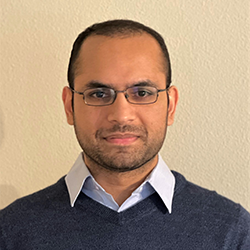
University Honors Top Jonsson School Mentor, Dissertation and Thesis
Amidst the pomp and circumstance of end-of-year commencement activities, a number of faculty, staff and students were honored for their contributions to academic excellence, student education and community involvement.
“We are proud to honor just a few of those who help make The University of Texas at Dallas one of the top universities in the country,” said Dr. Inga Musselman, UT Dallas provost, vice president for academic affairs and the Cecil H. Green Distinguished Chair of Academic Leadership. “There is a strong commitment here to academic and community excellence.”

2021 Provost’s Award for Faculty Excellence in Undergraduate Research Mentoring
Dr. Danieli Rodrigues, Associate Professor
Department of Bioengineering
Erik Jonsson School of Engineering and Computer Science
Dr. Danieli Rodrigues joined the Department of Bioengineering at The University of Texas at Dallas as an assistant professor in the Fall 2012, and she directs the Biomaterials for Osseointegration and Novel Engineering (BONE) Laboratory. Her research interests include orthopedic and dental biomaterials, and she also received a President’s Teaching Excellence Award in 2019. Her graduate research focused on orthopedic biomaterials; she primarily worked on the characterization of corrosion and failure mechanisms of hip implants and development of acrylic two-solution bone cements for the treatment of spinal compression fractures. From 2010 to 2012, Dr. Rodrigues worked as a senior research engineer at Zimmer, Inc. of Warsaw, Indiana. As a research engineer within the medical device industry, she developed test methods for performance verification and validation of new designs of hip and knee prostheses and related surgical instrumentation.
Rodrigues received her BS degree in chemical engineering from Universidade Federal de Santa Maria in Brazil in 2005. She then joined the Department of Biomedical and Chemical Engineering at Syracuse University, receiving a MS in 2007 and a PhD in 2010.

Best Dissertation Award
Peiyuan Kang PhD’20
Erik Jonsson School of Engineering and Computer Science
Photoinactivation of Proteins by Molecular Hyperthermia
Research Mentor: Dr. Zhenpeng Qin
Peiyuan Kang PhD’20 graduated with his doctoral degree in mechanical engineering from UT Dallas in May 2020. He has continued as a postdoctoral researcher in Dr. Zhenpeng Qin’s Nano-Thermal Bioengineering Laboratory. Kang’s research activities relate to various research frontiers in the fields of nanotechnology and biomedical sciences. During his PhD study, he focused on understanding the interaction between metal nanostructures and biological systems. He developed a method using plasmonic heating of gold nanovesicles to precisely inactivate proteins known as molecular hyperthermia. This technology can be potentially developed as a precise therapeutic method neurological disorders or cancers and infectious disease testing. Now, Kang’s study is trying to provide a comprehensive understanding of the interactions between pulsed laser and plasmonic nanoparticles, including plasmonic heating, nanoparticle fragmentation and photoacoustic effect.
Kang was born and raised in Xi’an, China. Prior to arriving in the U.S., he earned a bachelor’s degree at Harbin Engineering University with a focus on thermal energy and power engineering. In 2014, Kang began to pursue his master’s degree in mechanical engineering at UT Dallas and later joined Qin’s lab as a PhD student.

David Daniel Thesis Award
Gaurav Rajavendra Reddy PhD’20
Erik Jonsson School of Engineering and Computer Science
Machine Learning-Based Hotspot Detection: Fallacies, Pitfalls and Marching Orders
Research Mentor: Dr. Yiorgos Makris
Gaurav Rajavendra Reddy PhD’20 currently holds a research and development position at Intel Corp. in Oregon, where he is pursuing his passion to work with cutting-edge semiconductor technologies. His research interests include applications of machine learning in computer-aided design and design for manufacturability. Reddy holds two U.S. patents, has several publications in reputed conferences and journals and received numerous awards during his doctoral studies.
His dissertation titled “Machine Learning-Based Hotspot Detection: Fallacies, Pitfalls and Marching Orders” focused on a better understanding of the interaction between integrated circuit design and semiconductor manufacturing processes, with the objective of identifying weaknesses caused by this interaction, also referred to as hotspots. While pursuing his PhD, Reddy developed an array of solutions in this area which have redefined hotspot detection. His seminal contribution was presented at the 2019 International Conference on Computer-Aided Design.
Reddy received a Bachelor of Engineering degree from the Visvesvaraya Technological University Belgaum, India, in 2013. He earned his MS and PhD degrees from UT Dallas in 2019 and 2020, respectively. He also worked as a post-silicon validation engineer at Tessolve in India between 2013 and 2014.
A version of this story ran in News Center.







